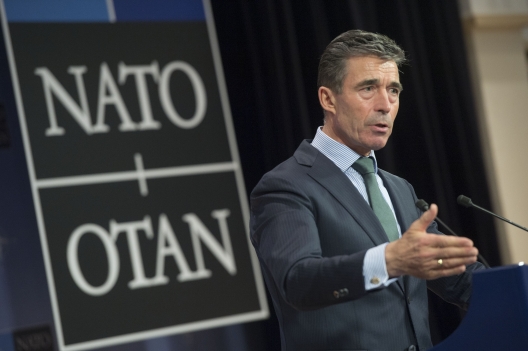 “I see Ukraine and Crimea in a bigger context,” Mr. [NATO Secretary General Anders Fogh] Rasmussen says. “I see this as an element in a pattern, and it’s driven by President Putin’s strong desire to restore Russian greatness by re-establishing a sphere of influence in the former Soviet space.”
“I see Ukraine and Crimea in a bigger context,” Mr. [NATO Secretary General Anders Fogh] Rasmussen says. “I see this as an element in a pattern, and it’s driven by President Putin’s strong desire to restore Russian greatness by re-establishing a sphere of influence in the former Soviet space.”
Destabilizing Eastern Europe and the South Caucasus is a pillar of the Kremlin’s strategy. “It’s in Russia’s interest to see frozen, protracted conflicts in the region, such as in South Ossetia and Abkhazia in Georgia, Transnistria in Moldova, and Crimea,” Mr. Rasmussen says of regions where Moscow has asserted control. “If you look at a map, you will see why it’s of strategic importance for Russia.”
Moscow’s interfering with states on the Continent’s eastern periphery prevents them from joining NATO, Mr. Rasmussen says, since the alliance is reluctant to accept new members involved with border disputes. “At the same time,” he says, “it plays a role in energy security. The possibility to establish alternative pipelines circumventing Russia—including through Azerbaijan and in the South Caucasus—is very much dependent on peace and stability in that region. All this is part of President Putin’s geopolitical and strategic thinking.”
The Kremlin needs modern weapons systems and well-trained forces to realize its vision, and Mr. Rasmussen is alarmed by the improvements he has seen in the Russian military during the past few years. Contrasting Russia’s military action against Georgia in 2008 with its invasion of Crimea this year, he says, “we have seen an incredible development of the Russian ability to act determinedly and rapidly. We have seen better preparation, better organization and more rapid action. They have also invested in more modern capabilities. We shouldn’t underestimate the strength of the Russian armed forces.” Now 40,000 of those troops are massed on the border of eastern Ukraine.
Moscow boosted military spending by 79% in the past decade, according to a Brookings Institution estimate, and military spending amounted to 4.5% of Russian gross domestic product in 2012, according to the World Bank. Most Western European states, by contrast, began cutting defense long before the recession and have kept doing so even as their economies have stabilized. France spent 1.9% of its GDP on defense in 2013; Denmark spent 1.4%; Germany, 1.3%; and Spain, 0.9%. . . .
Equally worrying is the West’s drive to unilaterally disarm its nuclear arsenal just as the Russian expansionist tide rises. The U.S. Defense Department on Tuesday announced that it will disable 56 submarine-based nuclear-launch tubes, convert 30 B-52 bombers to conventional use, and remove 50 missiles from America’s underground silos—all well ahead of the 2018 deadline set by the New Start Treaty with Russia and despite the crisis in Ukraine.
Reductions to Western nuclear forces “must take place in a balanced manner, based on more transparency” from Russia, Mr. Rasmussen says. “The fact is that since the end of the Cold War, NATO nuclear powers have reduced the number of nuclear weapons significantly, while you haven’t seen the same on the Russian side.”
The result is that “today you have a clear imbalance between the NATO powers and Russia in that respect,” Mr. Rasmussen says. “And in the light of ongoing events in Ukraine, I don’t think there is the right climate for moving forward when it comes to nuclear disarmament or arms control. There’s no sign whatsoever that Russia will provide more transparency.” (Following the interview, a NATO spokesman said Mr. Rasmussen wanted to add this clarification: “Reductions in U.S. strategic forces under the New Start Treaty do not affect the significant U.S. commitments to NATO or the U.S. nuclear-force posture in Europe. . . .”)
Has NATO’s engagement and cooperation with Moscow paid any security dividends? “Obviously not,” Mr. Rasmussen replies without hesitation. “We have seen a revisionist Russia trying to redraw the European map by force. That’s a wake-up call. That’s a completely new security environment and of course we have to adapt to that.” He adds: “This goes far beyond Crimea.”
Mr. Ahmari is an editorial page writer for The Wall Street Journal Europe.
Image: NATO Secretary General Anders Fogh Rasmussen, April 1, 2014 (photo: NATO)
